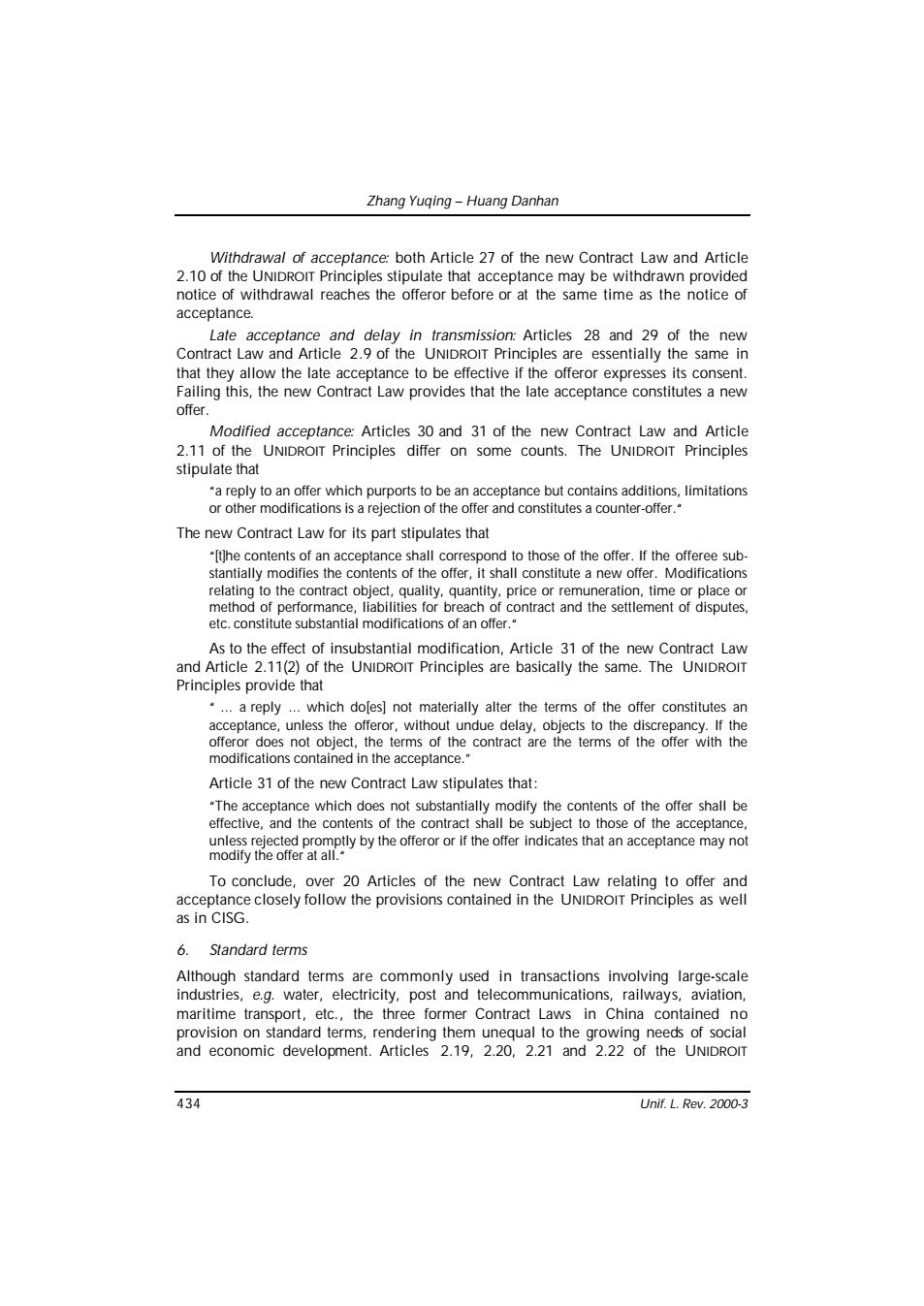正在加载图片...

Zhang Yuging-Huang Danhan Withdrawal of acceptance:both Article 27 of the new Contract Law and Article 2.10 of the UNIDROIT Principles stipulate that acceptance may be withdrawn provided notice of withdrawal reaches the offeror before or at the same time as the notice of acceptance Late acceptance and delay in transmission:Articles 28 and 29 of the new Contract Law and Article 2.9 of the UNIDROIT Principles are essentially the same in that they allow the late acceptance to be effective if the offeror expresses its consent. Failing this,the new Contract Law provides that the late acceptance constitutes a new offer. Modified acceptance:Articles 30 and 31 of the new Contract Law and Article 2.11 of the UNIDROIT Principles differ on some counts.The UNIDROIT Principles stipulate that "a reply to an offer which purports to be an acceptance but contains additions,limitations or other modifications is a rejection of the offer and constitutes a counter-offer." The new Contract Law for its part stipulates that "[t]he contents of an acceptance shall correspond to those of the offer.If the offeree sub- stantially modifies the contents of the offer,it shall constitute a new offer.Modifications relating to the contract object,quality,quantity,price or remuneration,time or place or method of performance,liabilities for breach of contract and the settlement of disputes, etc.constitute substantial modifications of an offer." As to the effect of insubstantial modification,Article 31 of the new Contract Law and Article 2.11(2)of the UNIDROIT Principles are basically the same.The UNIDROIT Principles provide that "..a reply...which doles]not materially alter the terms of the offer constitutes an acceptance,unless the offeror,without undue delay,objects to the discrepancy.If the offeror does not object,the terms of the contract are the terms of the offer with the modifications contained in the acceptance. Article 31 of the new Contract Law stipulates that: "The acceptance which does not substantially modify the contents of the offer shall be effective,and the contents of the contract shall be subject to those of the acceptance unless rejected promptly by the offeror or if the offer indicates that an acceptance may not modify the offer at all." To conclude,over 20 Articles of the new Contract Law relating to offer and acceptance closely follow the provisions contained in the UNIDROIT Principles as well as in CISG 6. Standard terms Although standard terms are commonly used in transactions involving large-scale industries,e.g.water,electricity,post and telecommunications,railways,aviation, maritime transport,etc.,the three former Contract Laws in China contained no provision on standard terms,rendering them unequal to the growing needs of social and economic development.Articles 2.19,2.20,2.21 and 2.22 of the UNIDROIT 434 Unif.L.Rev.2000-3Zhang Yuqing – Huang Danhan 434 Unif. L. Rev. 2000-3 Withdrawal of acceptance: both Article 27 of the new Contract Law and Article 2.10 of the UNIDROIT Principles stipulate that acceptance may be withdrawn provided notice of withdrawal reaches the offeror before or at the same time as the notice of acceptance. Late acceptance and delay in transmission: Articles 28 and 29 of the new Contract Law and Article 2.9 of the UNIDROIT Principles are essentially the same in that they allow the late acceptance to be effective if the offeror expresses its consent. Failing this, the new Contract Law provides that the late acceptance constitutes a new offer. Modified acceptance: Articles 30 and 31 of the new Contract Law and Article 2.11 of the UNIDROIT Principles differ on some counts. The UNIDROIT Principles stipulate that “a reply to an offer which purports to be an acceptance but contains additions, limitations or other modifications is a rejection of the offer and constitutes a counter-offer.“ The new Contract Law for its part stipulates that “[t]he contents of an acceptance shall correspond to those of the offer. If the offeree substantially modifies the contents of the offer, it shall constitute a new offer. Modifications relating to the contract object, quality, quantity, price or remuneration, time or place or method of performance, liabilities for breach of contract and the settlement of disputes, etc. constitute substantial modifications of an offer.“ As to the effect of insubstantial modification, Article 31 of the new Contract Law and Article 2.11(2) of the UNIDROIT Principles are basically the same. The UNIDROIT Principles provide that “ … a reply … which do[es] not materially alter the terms of the offer constitutes an acceptance, unless the offeror, without undue delay, objects to the discrepancy. If the offeror does not object, the terms of the contract are the terms of the offer with the modifications contained in the acceptance.” Article 31 of the new Contract Law stipulates that: “The acceptance which does not substantially modify the contents of the offer shall be effective, and the contents of the contract shall be subject to those of the acceptance, unless rejected promptly by the offeror or if the offer indicates that an acceptance may not modify the offer at all.“ To conclude, over 20 Articles of the new Contract Law relating to offer and acceptance closely follow the provisions contained in the UNIDROIT Principles as well as in CISG. 6. Standard terms Although standard terms are commonly used in transactions involving large-scale industries, e.g. water, electricity, post and telecommunications, railways, aviation, maritime transport, etc., the three former Contract Laws in China contained no provision on standard terms, rendering them unequal to the growing needs of social and economic development. Articles 2.19, 2.20, 2.21 and 2.22 of the UNIDROIT